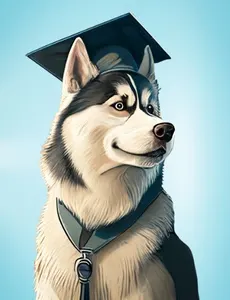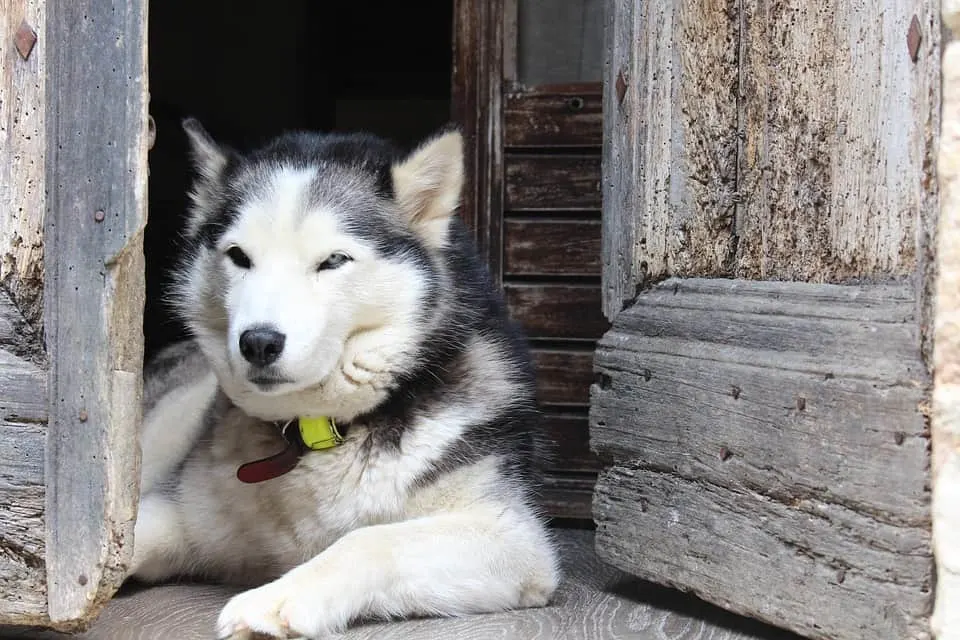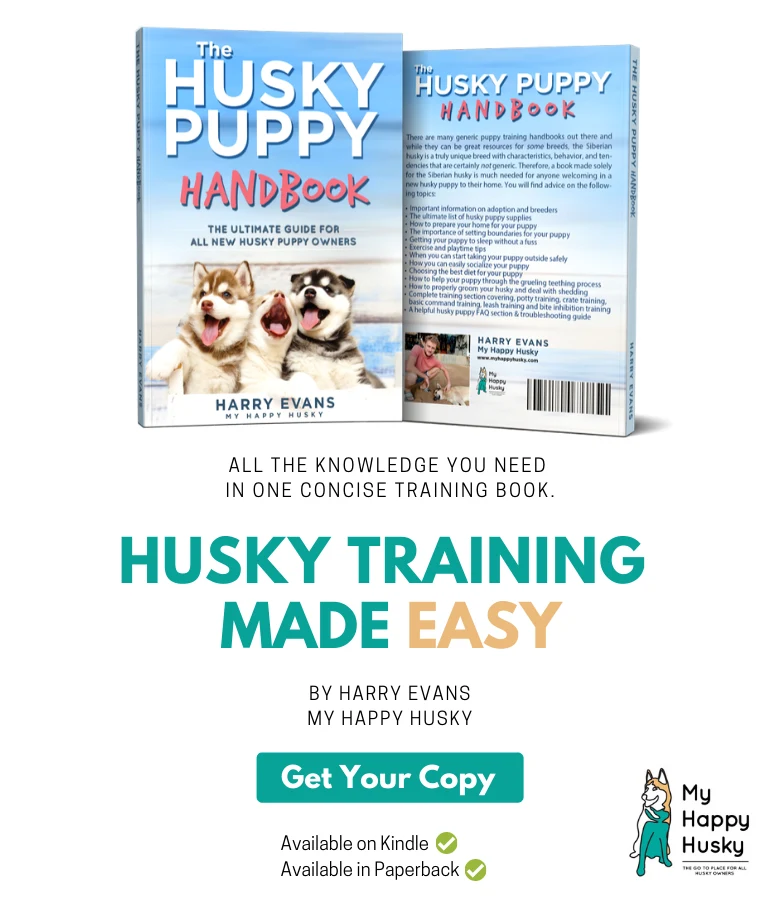When do huskies calm down? It’s something all husky owners are desperate to know shortly after bringing their husky home! This article has everything you need to know about hyper huskies, and calming them down.
All huskies calm down at different ages. For some, it may only be a year, and for others, it could be 2 or 3 years before they calm down. Ultimately, you can’t rely on age alone to get a calm husky.
Table of Contents
Why is my husky so hyper?
Huskies were first made to haul big loads over long trips in super cold weather. They did this job for a long time. So, they really like to move, run, jump, and be busy.
It’s no wonder that when a husky doesn’t receive enough of this kind of stimulation, their energy builds up and channels into less desirable behavior.
Huskies are also extremely social. They thrive on being in constant company with other dogs as well as humans and if they spend many hours at home alone this can easily lead to hyperactivity once the company returns to them.
To give a quick conclusion, huskies are a very energetic and social breed. If they don’t receive physical and mental stimulation this is extremely likely to be the cause of hyperactivity and other behavioral issues.

Psst. A quick word on training! Brain Training For Dogs is one of the best training methods suitable for a husky. Other owners and I are seeing improvement in obedience, behavior, and stubbornness quicker than ever before. I seriously recommend checking it out.
6 Effective Ways to Calm Down a Hyper Husky
First I will go through the basic needs of a husky in order to be a well-behaved calm dog. After I will include some more interesting, less thought of ideas you can try to keep your husky happy, and not hyper!
1. Exercise (amount and type!)
We all know that huskies require a lot of exercise, that’s a given. However, some people, despite knowing this, still may not be giving their husky enough exercise.
The ideal amount of exercise for an adult husky should be at least 2 hours per day. A lot of people usually only have the time for 1 hour per day, but your husky is better off with 2 hours per day.
Your husky would benefit more if you were to separate his exercise; one hour in the morning and one hour in the evening.
Once you know how much exercise your husky needs, you’ll want to know the best kind of exercise for him. If he’s in good shape, he’ll need workouts that make him work hard. This means stuff like running, chasing things, jumping, hiking, doing agility courses, pulling sleds, or even swimming.
Taking your husky out for a stroll or casual walk, without any high-intensity periods, will not stimulate him how he actually needs. So be sure to look over your exercise routine and adjust it, if need be.
2. Diet (think about protein levels)
A good diet is essential for all-round health and well-being. Just like us, our diet plays a large part in our energy levels and how well we function. See top-rated brands for huskies.
If you give a kid a big bag of candy, it’s not long before they’re bouncing off the walls with energy. If you feed your husky the wrong thing or too much of something, the same will happen with him too.
Protein is essential for good health in dogs. Protein is easily digestible and it’s suggested for huskies to eat a diet with ample protein.
However! too much protein is a sure-fire way to have your husky bouncing off the walls like a kid with candy.
Your husky has an efficient metabolism and doesn’t need much food for sustained energy. If he receives too much protein this will be stored as energy and will contribute to bursts of hyperactivity.
It’s normal for around 30% of his food to be protein. But if he’s very hyper and not particularly active, try lowering this down to 20-25% to see if his behavior changes for the better. Always speak to a vet for advice when altering his diet.
3. Doggy playgroups
Doggy playgroups are becoming increasingly popular, and I think they are a fantastic idea. The groups are essentially just like meet-up points or classes held in either the local park or community center where your husky can meet and interact with new dogs.
Huskies are very sociable and love to play around with a friend. Socialization proves to be great mental stimulation and will use up copious amounts of energy. Not only that, but he’ll leave the session feeling very happy and satisfied. This will almost always lead to a calmer husky when you’re back home.
Interacting with other dogs is an important part of creating a well-behaved calm husky. Huskies who lack socialization can get bored and frustrated. It’s very common to see bad behavior and hyperactivity with any breed that doesn’t receive regular social experiences.
4. Obedience training
A well-trained husky is a happy husky. This is certainly true!
Although huskies are known for being stubborn, they’re highly intelligent and need to be trained and guided in order to be well-behaved.
A great training method you can use from Dr. Ian Dunbar will help your husky become calmer when out for walks. It’s called the red light, green light method.
Essentially, when it’s time for you to take your husky out on walks and you say “walkies” It’s likely he’ll go crazy. Your response is to stay still and wait for him to stop and sit down. At first your husky will be confused and try many different creative attempts to get you moving. Ignore him and wait until he eventually sits down.
When he calms down, give him praise and keep going. He might get hyper again right away. If he does, just stop and wait again. Over time, your husky will learn to stay calm. He’ll figure out that being calm is what makes you keep moving.
I will admit, reading the method sounds a little silly, but when you put it into practice, you can quickly see how it works.
You can also implement this throughout your walk on the way to the park. Every 20 yards stop and wait for him to sit down and wait patiently. Praise him only when he sits down and remains calm.
If you implement this procedure throughout every day, it will definitely lead to a more overall calm husky within a week or so.
5. Calm environment (use soothing music)
When you put a baby to sleep your ensure the environment is calm and free from loud noises and distractions. Try creating a similar space with your husky in your home.
If you live in a noisy area, try keeping your husky in the room furthest away from the noise.
An interesting study indicates that music can in-fact help dogs. Certain kinds of classical music with specific beats per minute can help calm down a hyper dog and decrease their heart rate. There is now a lot of music for dogs available on Youtube, Spotify, iTunes, and Amazon. Source
6. Interactive dog toys (the golden ticket)
Interactive toys or otherwise known as puzzle toys are extremely beneficial in many ways.
Interactive toys often contain some kind of puzzle that your husky has to figure out and when he does, a treat will be dispensed. There are different kinds of toys with different levels of difficulty.
One of the first and most obvious benefits is that he’s going to be extremely interested and focused on an interactive toy containing a tasty treat for much longer than any regular chew toy.
Secondly, and most importantly, it’s getting your husky to think; and use his brain to solve the puzzle to release the treat. Although it may not be very difficult for us, it’s significant for him. And this will provide extremely valuable mental stimulation which is just as necessary as his physical stimulation (exercise).
Increasing the amount of mental stimulation your husky receives will almost certainly decrease his hyperactivity. I have an article dedicated to mental stimulation with 8 great ideas for you to try. You can check it out here.
Popular Articles on My Happy Husky:
13 Signs That Your Husky Actually Loves You
How To Completely Train a Husky Puppy

When do huskies calm down?

Husky puppies will display more hyperactivity than adult huskies, which is usually accepted by us. Although, it will leave you wondering when your husky will calm down? This isn’t so easy to answer. Let me explain.
So, when do huskies calm down? Well, the personality of each husky will vary so it makes it very hard to define a set age when your husky will calm down. Some will naturally be calm from the beginning, and some will be hyperactive for longer.
All you can do is ensure you start training him and giving him the correct amounts of both physical and mental stimulation. If these three things are properly managed, your husky will be a well-behaved, calm husky.
One important thing to remember
The Siberian husky is a youthful, energetic breed. It’s in their genes to be energetic! So having energy is exactly what they’re supposed to have.
Always take a step back to evaluate your own situation and think about whether or not your husky is in-fact hyper, or if he’s just being a normal husky.
Thank you for reading!
Other helpful related articles – My Happy Husky
How much exercise does a husky puppy need?
Can you leave a husky home alone?
Best dog crate for a husky 2020
Most Recommended For Huskies 🐶
Best Brushes For Husky Shedding ⭐
My two favorite brushes for a beautiful coat are a simple Undercoat Rake and a Slicker Brush. These brushes when used together will de-shed and maintain your husky’s coat better than anything else.
Best Online Training Program For Huskies⭐
Brain Training For Dogs has become very popular with Siberian Huskies in the last few years. Owners that have tried it say amazing things about the incredible results and how easily implemented the training is.
Best Husky Puppy Book ⭐
If you would like to support My Happy Husky directly and have an easy to read and entertaining guide for training your husky puppy, check out my book The Husky Puppy Handbook on Amazon. All purchases are greatly appreciated.

Disclaimer
The advice given in this article is for educational purposes only and does not constitute professional advice in any context. Before making any decisions that may affect the health and/or safety of your dog, you should always consult a trained veterinarian in your local area. For the FULL disclaimer Visit HereCopyright Notice: The content produced and published on My Happy Husky is unique and original. My Happy Husky makes an active effort to search for plagiarized content using plagiarism detection software. If plagiarized content is found, action will be taken.
